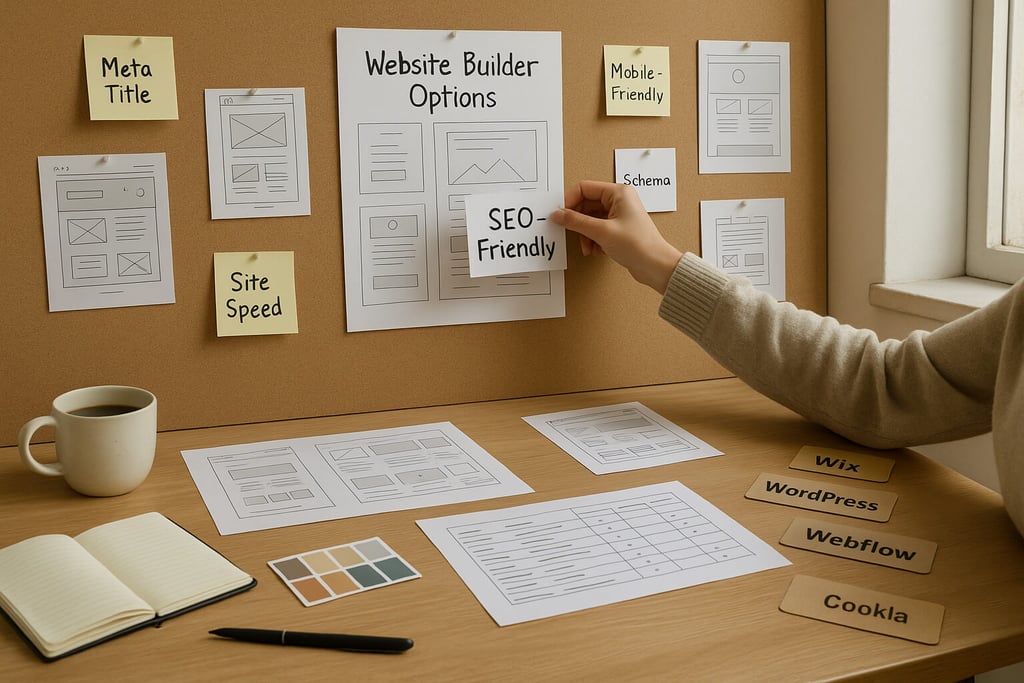SEOJet Flight Blog
Best Website Builder for SEO: Top Choices for Ranking
Find the best website builder for SEO to improve your ranking! Explore a list of the best SEO website builders for a great website.
TECHNICAL SEO
Ardene Stoneman
5/1/20255 min read


What’s the Best Website Builder for SEO in 2025?
Choosing the right website builder has a direct impact on your site’s SEO performance.
Whether you're building from scratch or moving to a new platform, understanding how different builders handle SEO features can save you time, technical frustration, and missed traffic opportunities.
This article walks through how to find the best website builder for SEO in 2025, based on what actually matters for search performance.
Outline of the Article
What Makes a Website Builder SEO-Friendly?
Is There a Best Website Builder for SEO?
Why Website Builder SEO Features Matter
How to Choose the Right Website Builder for SEO
Wix and Its SEO Capabilities in 2025
Comparing Top Website Builders for SEO
Technical SEO in Website Builders
Are AI Website Builders Any Good for SEO?
SEO Best Practices Built into Website Builders
Do You Still Need Plugins Like Yoast SEO?
Should You Prioritise SEO Tools or Design?
Final Tips to Choose the Best Website Builder for SEO
1. What Makes a Website Builder SEO-Friendly?
A website builder is SEO-friendly when it allows you to control the basic and advanced SEO elements needed to rank your pages.
Some builders give you more freedom, while others limit access or bury features deep in menus.
Core SEO capabilities to look for:
Control over meta titles and descriptions
Custom URL structures
Alt text for images
Header tags (H1, H2, etc.)
Mobile responsiveness
Fast page load times (site speed)
SSL security
Schema support or integration
These form the foundation of what any builder must offer to be a viable option for SEO in 2025. Builders that don’t allow you to implement SEO best practices should be avoided.
2. Is There a Best Website Builder for SEO?
There isn’t one single best website builder for SEO. Instead, several builders offer strong SEO features but vary in flexibility, cost, and ease of use.
The best website builder for SEO depends on your needs, skills, and how much control you want.
For example:
Wix offers built-in SEO tools and a beginner-friendly SEO wizard, but less flexibility for advanced users.
WordPress (with a builder like Elementor) offers full control but requires hosting, setup, and SEO plugins.
Shopify is strong for ecommerce SEO, but has URL structure limitations.
If you're looking to build a website with strong SEO from day one, choosing a builder that supports these needs is more important than picking a popular website.
3. Why Website Builder SEO Features Matter
Using a website builder that supports SEO features directly affects how your site performs in search engines. Builders also impact:
Indexability: If Google can’t crawl your site properly, it won’t rank.
Speed: Slow-loading pages hurt your SEO efforts.
Responsiveness: Google prioritises mobile-first indexing.
Structured data: Some builders include basic schema or plugins to add it.
Builders like Wix have made major improvements in recent years, including tools like SEO Wiz and better mobile handling. But many website builders are designed for simplicity, not optimisation.
4. How to Choose the Right Website Builder for SEO
Start by thinking about what kind of website you’re building. Is it a blog, service site, or ecommerce store? Then, shortlist builders based on these SEO capabilities:
Built-in SEO tools (or plugin support)
Control over essential SEO elements (like headers and URLs)
Support for custom code or advanced SEO features
Compatibility with tools like Google Search Console and Analytics
Choosing the right website builder for SEO means finding one that fits your technical ability and doesn’t limit you as your SEO strategies develop.
5. Wix and Its SEO Capabilities in 2025
Wix is one of the most widely used builders. In the past, it had a reputation for poor SEO, but that’s changed. In 2025, Wix SEO includes:
Editable meta tags and structured headings
SEO Wiz: a guided setup for basic SEO
Redirect management
Image optimisation tools
Built-in schema support for products and articles
That said, limitations remain. Advanced SEO users may find Wix restrictive when trying to add custom structured data or edit robots.txt.
Still, if you need a fast setup and basic SEO tools out of the box, Wix is a strong option for many.
6. Comparing Top Website Builders for SEO
Let’s compare how top website builders stack up in terms of SEO:
Each builder offers different levels of control and performance. The best SEO website builders aren’t always the most popular website builders.
7. Technical SEO in Website Builders
Technical SEO refers to how well your website is structured behind the scenes. This includes:
Crawlability
Site speed
URL structure
Redirect handling
Schema markup
Sitemap generation
A good website builder should help implement technical SEO features automatically or give you control to manage them. Webflow and WordPress are strong here. Wix has made progress, but technical users may still run into limits.
For essential SEO, technical control can make or break your visibility.
8. Are AI Website Builders Any Good for SEO?
AI website builders are becoming more common. Many now offer automated page generation, keyword suggestions, and layout tools. But do they help or harm SEO?
Pros:
Fast setup
Automated on-page SEO elements
Helpful for non-technical users
Cons:
Over-simplified page structures
Lack of control over code
Often miss advanced SEO elements
If you’re considering an AI website builder, make sure it still gives you access to edit meta data, adjust URLs, and integrate tools like Google Analytics.
9. SEO Best Practices Built into Website Builders
Some website builders come with built-in SEO features or guided wizards. These tools can help you:
Set up meta titles and descriptions
Add alt text to images
Create clean URLs
Add internal links
Optimise headings
Look for builders that promote SEO best practices during setup. Builders like Wix, Shopify, and Squarespace include SEO setup wizards, but you’ll still need to understand what those settings actually do.
Even the best website builder for SEO won’t do everything automatically. You still need to know how to optimise your website for search.
10. Do You Still Need Plugins Like Yoast SEO?
If you use WordPress, you’ll likely add plugins like Yoast SEO or Rank Math. These provide advanced SEO features, from readability checks to structured data tools.
Website builders like Wix don’t use plugins the same way. Instead, they offer built-in SEO features or app-based tools.
Ask yourself:
Do I want full control?
Do I need plugins like Yoast SEO?
Will I use external tools like Google Search Console?
For many users, a builder that offers basic SEO tools is enough. But if you want to scale or customise heavily, plugin support matters.
11. Should You Prioritise SEO Tools or Design?
It’s easy to get distracted by visual templates and design options when choosing a website builder. But design without SEO is wasted.
Consider:
Does the website builder offer control over headings and structure?
Are templates responsive and lightweight?
Is it easy to add alt text and internal links?
SEO elements like layout clarity, fast load times, and proper header structure matter more than flashy animations. A great website looks good and performs well in search.
Many website builders are designed with aesthetics first, so check how deeply you can optimise your site’s SEO before committing.
12. Final Tips to Choose the Best Website Builder for SEO
To choose the best website builder for SEO in 2025:
Decide what kind of site you need to build (blog, shop, portfolio)
Look for strong built-in SEO tools or plugin compatibility
Check if you can control technical SEO elements
Compare builders based on SEO, not just ease of use
Test website speed and mobile responsiveness
No single builder is perfect for everyone. The right website builder for SEO is one that matches your technical ability, supports your goals, and doesn’t hold you back.
Summary: What to Remember
Many website builders offer SEO features, but not all are equal.
Wix has improved and includes built-in SEO tools like SEO Wiz.
WordPress offers the most flexibility if you're happy using plugins.
AI website builders are fast but often lack advanced SEO capabilities.
Technical SEO control is key if you want to scale your site.
Choose based on what you need now and what you might need later.
Make sure your builder supports tools like Google Analytics and Search Console.
Good SEO starts with the builder, but it depends on how you use it.
If you’re unsure which builder is best for your site, or how to improve your website’s SEO setup, talk to SEOJet. We work with what you’ve got and help you build what works.
Services
Contact Us
Newsletter Signup
sales@seojet.co.uk
01934 289 404
© 2025. All rights reserved.


Locations
Weston-super-Mare
Somerset
Bristol
9am - 6pm, Monday to Friday
Suite 2, Unit 7, 12 Beaufigter Rd, Weston-super-Mare, BS24 8EE
